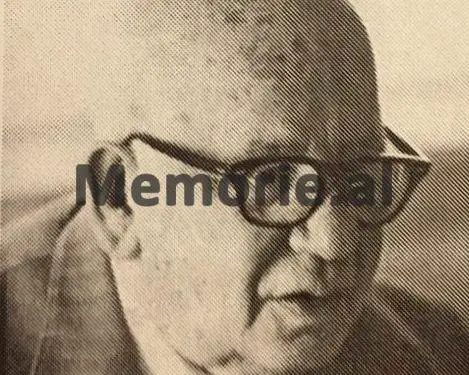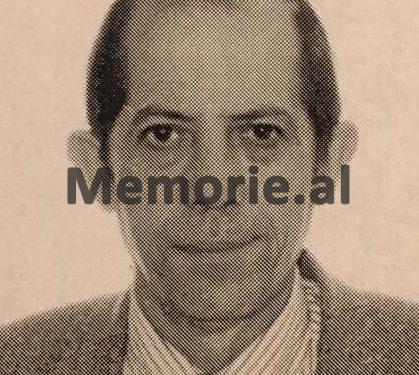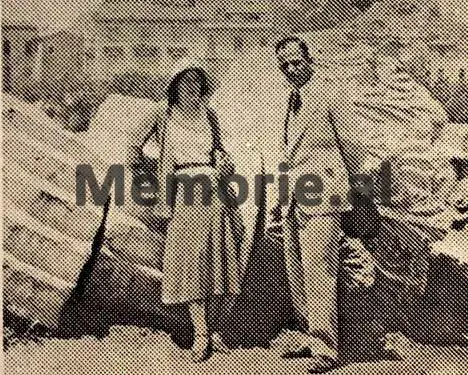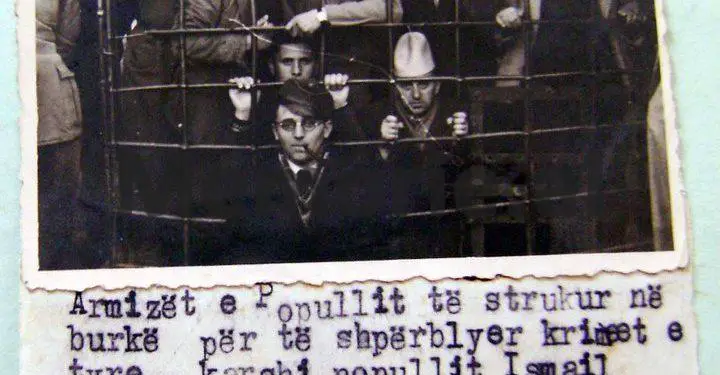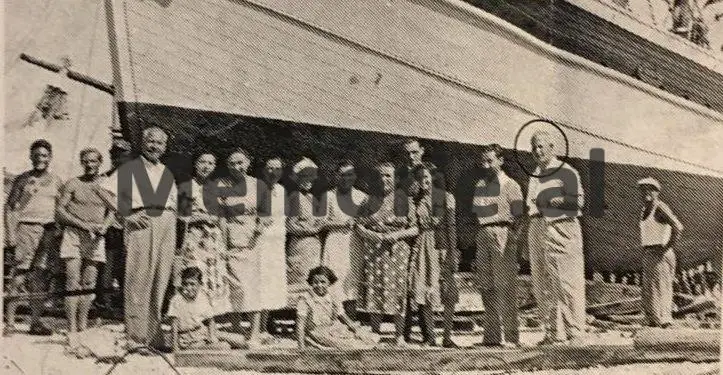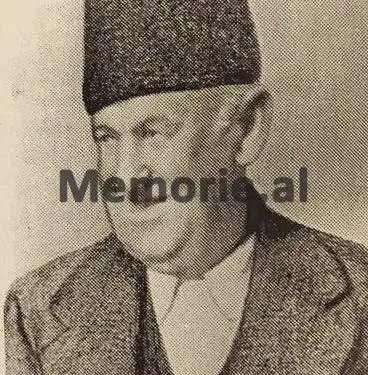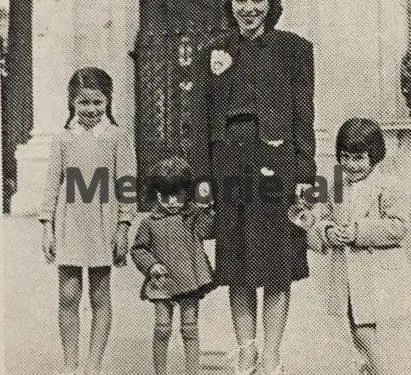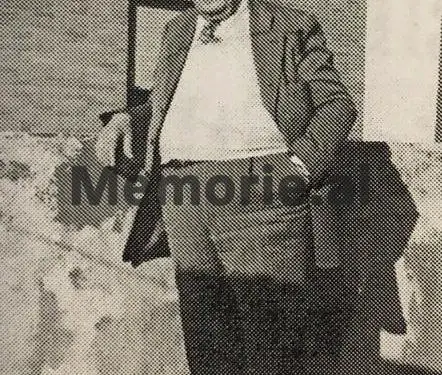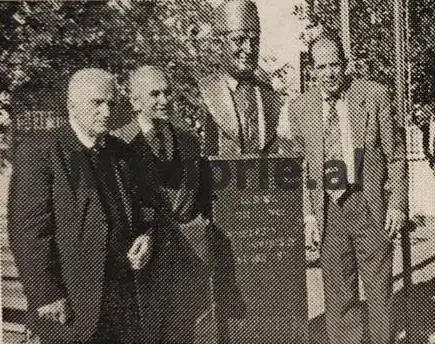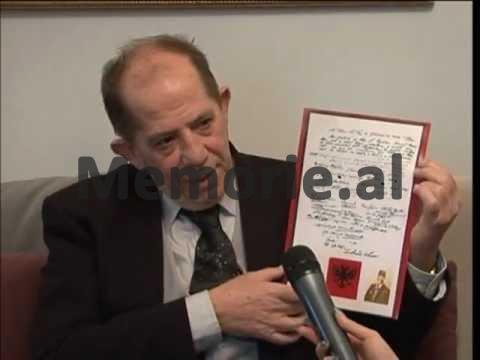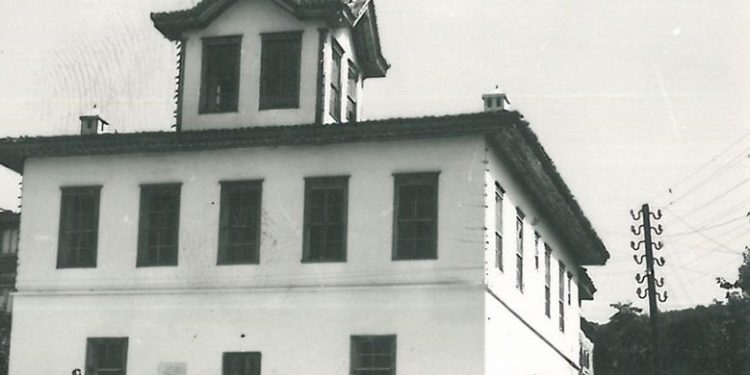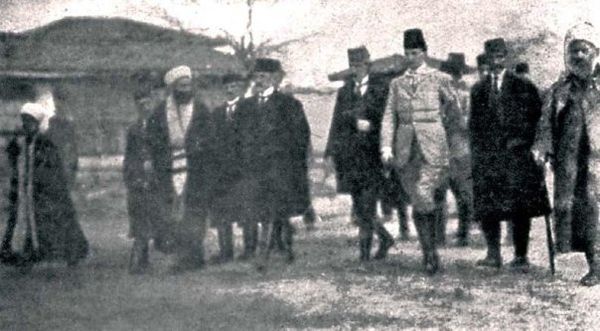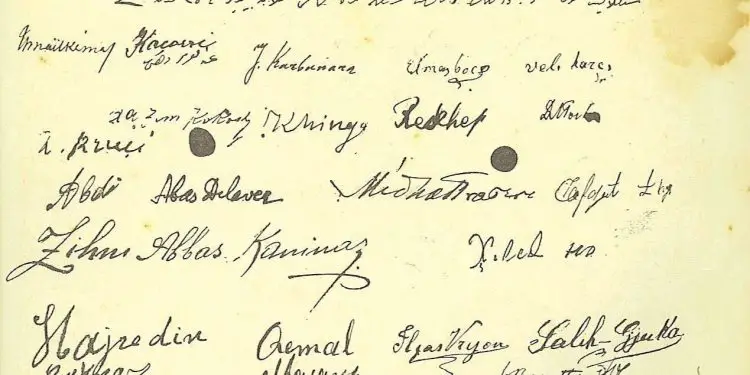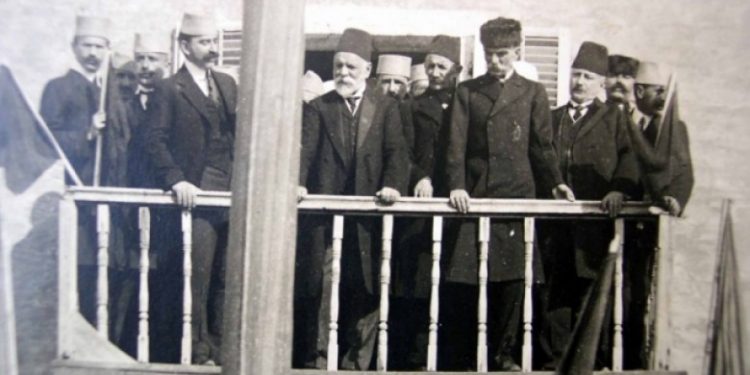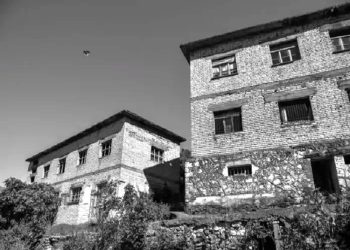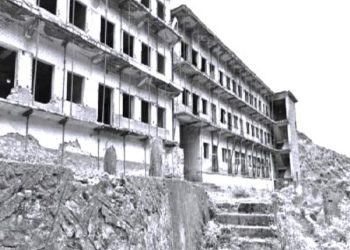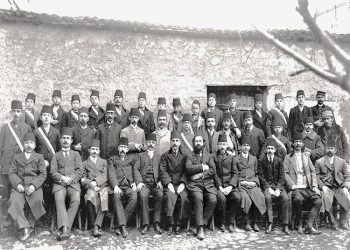Dashnor Kaloçi
Memorie.al publishes the unknown story of the large Sefa family from the city of Lushnja, which from the period of the Ottoman occupation in the first years of the last century, that of the Zog Monarchy, until the end of November 1944, was one of the richest families, not only in the area of Myzeqe but also in the whole of central Albania and beyond, due to its commercial activity led by its first, Nebi Sefa, who was also a patriot. great, because in November 1912, together with his close friend, Qemal Karaosmani, and Ibrahim Efendi Borshin, they accompanied Ismail bey Qemali from Kavaja to Vlora, signing the act of independence. Testimonies of his nephew, Nebi Sefa young, for his grandfather, one of the main organizers of the Lushnja Congress, a well-known merchant, and philanthropist who brought grain to the Musketeers during the famine, which during the Zog Monarchy, was one of the most powerful businessmen, winning the Gold Medal at the Fiera del Levante Fair in Bari, Italy. The departure of Nebiu’s son, Ismail, from Albania in November ’44 to escape the communists’ revenge for agreeing to be elected to the Albanian parliament during the period of occupation and the destruction of their family. after the Communists came to power, two of the nephews of the Independence Signatory were sentenced to death and shot, and Ismail’s wife, with four young children, ended up in prisons and internments, although Ismaili, one of the businessmen and merchants. The powerful man who lived and worked in Italy until 1984 (when he passed away), re-paraded free of charge the ships of the Albanian merchant fleet, on his construction site in the Italian city of Civitanova.
“Although my father’s family, Ismail Sefa, had made a great contribution to the benefit of the Albanian cause and my two grandparents, Nebi Sefa and Qemal Karaosmani, had taken over and accompanied Ismail Qemali from Kavaja to the city of Vlora, where and had signed alongside him in the act of the Declaration of Independence, immediately after the communists came to power, we were hit and massacred in the most barbaric way by them. From the beginning of 1945, the communists confiscated all our movable and immovable property, removed us from Tirana, and deported us to Durrës, Kavaja, and Elbasan.
A year later, in 1946, the Communists arrested my 24-year-old uncle, Qamil Sefa, who had graduated in Agronomy in Italy, and sentenced him to life in prison. A few years later, in 1949 and 1951, the communist regime arrested and shot my father’s two grandchildren from the city of Lushnja, Lim, and Hamdi Sefa. After we were left in a miserable economic situation, suffering for a living, and since we saw no other chance of survival, in 1954, my mother, Sharia (Karaosmani) took me and my three sisters, and we set off for Maqellara to ‘escaped from Albania. “But we were caught near the border and my mother suffered for two years in the prisons of the communist regime.”
The man who speaks and tells Memorie.al for the first time is Nebi Sefa, the son of the famous patriot Ismail Sefa from the city of Lushnja, who tells the whole painful story of his family during the years of Enver’s communist regime. Hoxha. What is the origin and past of the Sefa family from Lushnja and what activity did it deal with from the middle of the 18th century until 1944? Who were the most prominent men of that family and what contribution did they make during the period of the National Renaissance, in the Declaration of Independence in Vlora, and in the organization of the Congress of Lushnja? What was their activity during the period of the Bird Monarchy, during the years of the Anti-Fascist War and why with the coming to power of the communists, the Sefa family was persecuted in the most barbaric way, where many of them were executed, imprisoned or exiled until the beginning of the ’90s?
Who was Ismail Sefa?
Ismail Sefa was born on December 23, 1902, in the city of Lushnja and he was the eldest son of Nebi Sefa, one of the well-known patriots of Myzeqe. Since his family was one of the richest in the whole province, Ismaili did not have the opportunity to be educated, because, at the age of 12, he went to work helping his father, Nebi, in the administration of the property and family properties. In this regard, Ismaili’s son, Nebi Sefa, states: “Since the age of 17, my father, Ismaili, has been involved in business and the family economy. At that time he was engaged in the production of wood coal, which he distributed as fuel throughout the city of Lushnja. In that business, he had great success, especially after buying a truck that was a means of transport (working with kerosene), which at that time was very unknown and special, because until then the means of transport were only animals. and carts. That kind of business brought him a very satisfying income, and in the years 1919-’20s, he expanded his business by importing and exporting to Italy. One of the old sailors from Shkodra, originally from Ulcinj, named Reshit Ulqinaku, shortly before his death in the asylum for the elderly in Kavaja, testified: In the years 1919-’20, for two years I was agreed by a merchant boy from Lushnja, named Ismail Sefa, who had as a partner, Ahmet Resuli and a Toptanas from Tirana, made their weekly transports from Semani to Brindisi and vice versa, where they brought leather, eggs, and local products, bought coffee, usury, crystals, sugar, etc. ”
One of the most famous of this rich and aristocratic family was Ismail Sefa and his son Nebiu, who was born in 1861. In addition to the commercial activity that the Sefa family was engaged in, Ismaili and his son, Nebiu, collaborated. closely with many well-known patriots, such as Ymer Pasha Vrioni, Baba Dudë Karbunara, Qemal Karaosmani, etc. In 1907, Nebi Sefa set up the first Albanian school in the city of Elbasan, and in 1912, he received and escorted Ismail Qemali from Kavaja to Vlora, when he declared the Independence of Albania. For the escort of the old man of Vlora, Nebi Sefa received instructions from his friend Qemal Karaosmani (Elbasan) and had the unstinting help of the Commander of the Lushnja Gendarmerie, Ibrahim Efendi Lekës. After the joint sacrifices they made, the three patriots formed an inseparable marriage between them: Nebi Sefa, married his daughter to Ibrahim Leka’s son (a recent graduate in Istanbul), and in 1932, the bride for his son, Ismail, daughter of Qemal Karaosmani (Elbasan) Sheriar. Also in 1920, Nebi Sefa was one of the members of the organizing committee of the Congress of Lushnja. In addition to commercial activities, my father Ismaili did not for a moment sever the relations of cooperation with his close friends, patriots such as Hasan Prishtina, Qazim Begolli, Hoxha Kadria, etc., whom he respected as friends of his father, Nebi, becoming a member of the Committee for the Liberation of Kosovo. Also during that period, he made friends with many other patriots, such as Spiro Kolea, Zenel Gjoleka, Ismail Haki Tatzati, Bahri Omari, Sheh Ibrahim Karbunara, Hysen, and Iljaz Vrioni, etc. In addition to these well-known politicians, Ismaili also had friendships with well-known intellectuals of the time, such as the well-known doctor, Prof. Dr. Shaqir Kolonja, Xhavit Beli, Naim Vreto, etc.
Ismaili, powerful trader and businessman
Until 1920, Ismail Sefa and his father Nebiu engaged in commercial activity and the center of their activity was the city of Lushnja. Regarding this and the business activity of that family during the ’20s and during the period of the Zog Monarchy, his son, Nebi Sefa, says: The capital of Tirana, my father, Ismaili, left his hometown and came and settled in the city of Tirana. While he came to Tirana, his grandfather, Nebiu, stayed in the city of Lushnja, where he was the basis of their commercial activity and most of our family’s property. After arriving in the city of Tirana, Ismaili, began a wide commercial activity, as at that time he won the big tender and signed a contract to supply the Albanian army with clothing, food and everything else he needed for its needs. After that large-scale commercial activity, Ismaili also obtained a license to run the Albanian fish enterprise, depending on the construction and operation of the Butrint Dajlans in Karavasta, as far as the Buna River and Lake Shkodra. With that activity, which he had with the “Pescalba” Society, he won the ‘Gold Medal’ for four years for the Albanian fish, at the Fire di Levante Fair in the city of Bari in Italy. As a result of that activity, the father became very close friends with some Italian personalities in the field, such as fish industrialists Natale, Mastronardi, commentators Tizzi and Spartera, as well as Omero Fioretti, Angelo and Vitorrio Canaletti, etc. After that, in the early 1930s, the father founded the mining company called “Vulkan”, with which he obtained a license to search for minerals in the Albanian underground. During those years, seeing that the governments of that time began investing in the regulatory plans of many Albanian cities, he extended his activity in the field of construction. Wanting to contribute to urban development projects, he built a large three-story building on Durrës Street, opposite the former Yugoslav embassy. At the time, the building was hailed as a cozy and modern building, like those of Europe’s most advanced countries. After that building (which is still our property today), the father erected two other buildings, just as comfortable, one in the city of Lushnja (Vila Sefa, the former District Court) and the other in the “Kala” neighborhood, in the city of Elbasan. Afterward, the father undertook large investments in the wood processing branch, setting up a large plant in the village of Kular in Divjaka, where he built a 24 km long decovil line to transport timber. from Kulari to Gradishta. In addition to this activity in the field of construction, Ismaili was activated in the first steps that were taken at that time for electricity supply projects of large centers of the country, ranking as one of the main shareholders of the company of production and distribution of electricity. named “SITA”, founded by Alexander Hobdar. During this time, he was one of the main shareholders of the import company of various products “SASTEB”, which owned most of the Albanian market “, says Nebi Sefa, about the activity of his father, Ismaili, who since the beginning of the ’20s, during the whole period of the Zog Monarchy, was one of the most famous names of the Albanian business, which from time to time financed and helped with significant amounts the Albanian Red Cross and Poverty Shelter in Tirana.
Deputy and escape in 1944
Although throughout the period of the Zog Monarchy, Ismail Sefa, had only looked at his activity in the field of business and had never interfered in politics, in the autumn of 1943, he agreed to participate as a member of the Albanian Parliament. He accepted this after the request made to him by the representatives of the High Regency, who reminded him that in 1912, his father, Nebiu, had been the representative of Lushnja and Berat in the Assembly of Vlora, where he was announced. Albania’s independence. Regarding this period of time, his son, Nebiu, says: “My father, Ismaili, had right-wing political convictions and during that time his closest friends and comrades were the nationalists and the main exponents of the Balli Kombëtar organization. During that period when his father was an MP, he had a good desire, as a representative of Lushnja, to do something concrete for the people of that city. As early as August 1943, when he had not yet entered Parliament, he made a request to the Education Inspectorate of the relevant Ministry (CAA no. 1677/7 dated 04.08.1943), requesting that he was building a school in the city of Lushnja, which he would finance with his own income. But this was not made possible by the course of events that followed. Seeing the precipitation of the course of events, when the communists were sure of coming to power, in November 1944, the father decided to leave Albania, leaving us here with our four children, together with his mother, Shariar. He escaped together with Mentor Qoku, Hysni Jeniçeri, Nermin Vlora Falaskin, etc., and settled in Italy, where he had a large number of friends and comrades “, says Nebi Sefa, about the escape from Albania of his father, Ismaili, who for almost a year had participated as a deputy in the Albanian parliament of that time.
Persecution of the Sefa family
Immediately after Ismail Sefa’s escape from Albania, the communist regime that came to power began revenge against his family. In this regard, Nebiu states: “Since the beginning of 1945, the Communists have seized all of our family’s movable and immovable property. After that, a year later, in 1946, the Communists arrested our 24-year-old uncle, Qamil Sefa (Ismail’s brother), who had graduated in Physical Education in Bologna, Italy. Qamil was sentenced to life in prison and then to 101 years, and from various amnesties, he was released only in 1962, a sentence he served in Burrel’s dreaded prison. After his release, he married, and immediately after starting a family, he was deported again to Levan, Fier. In 1948, we were removed from Tirana and interned in the city of Elbasan. The persecution of the Sefa family by the communist regime of Enver Hoxha continued again in 1949 and 1951, when two relatives of the father were arrested in the city of Lushnja, Lim and Hamdi Sefa, who were later executed, for the sole fact. , who were relatives of Ismail Sefa. Seeing our extremely difficult economic situation and having no other way out, around 1954, our mother Sheriari took us four children (me and my three sisters, the eldest being 17 and the youngest me). , 10 years old) and we left and went to the village of Maqellarë in Peshkopi, with the intention of escaping from Albania. But we could not escape, because we were caught near the border, by the betrayal of a villager in that area, who had undertaken to cross us to the clone. After we were caught, we were detained for one day at the Peshkopi Internal Affairs Branch and the next day we were sent to Tirana, where only the mother and older sister were kept under investigation. A month later, her sister was released and her mother was taken to court, where the prosecutor demanded that she be sentenced to ten years in prison. But he was only sentenced to two years in prison after the court took into account the miserable economic circumstances in which we found ourselves. After the mother all ended her sentence, in 1956, from the city of Elbasan where we were interned, we as a family allowed us to go to the city of Durrës and then they removed us from there, we settled in Kavaja. During those years in Italy, Father Ismaili was one of the most powerful businessmen in the construction and repair of merchant ships and fishing boats. During the forty years he stayed in Italy, he never stopped working, being a successful businessman in the construction of large ships and tourist yachts, as the owner of the Construction Company “Naval Cantiere-Ismail Sefa S.A.S.” in the town of Civitanova Mache, near Ancona. During that time he built 130 fishing boats that still fish in all the seas and oceans of the world where they are sold. Although the father had a large fortune, the Albanian state did not allow him to financially support his family, and even during those years, we were stopped from correspondence with letters. But depending on the political situation in the country, there were times when they let us write letters or bring us a small package. This happened in 1960-’62, when the father helped the Albanian state, repairing for free on its construction site, a large number of fishing boats, or cargo ships. Only after that, his four children, the communist state, gave us the right to finish high school. But a few years later, after we were out of work, we were again fired from Education and left to work as laborers, with the exception of our older sister who retired as a teacher. His father, Ismaili, passed away on August 15, 1984, at the age of 82, shortly after the completion of the 8-story tourist residential hotel, which is still known today in the pages of Italian newspapers as the Albergo ex Sefa Hotel. At the time of Ismaili’s death, even though he was a political fugitive, our family in Kavaja, for nearly 40 days, did not share the visits and condolences of many friends and benefactors, among whom there were many communist communists. party in the pocket. We did not find that warmth only in those days, but the suffering people of Kavaja kept us close, morally supporting us throughout the period (1956-1993) that we lived in that city “, concludes his story Nebi Sefa, on the painful history of the family that suffered for more than 45 years under the communist regime of Enver Hoxha, for the sole fact that they had been rich and his father, Ismaili, who had fled Albania, had been declared an enemy. With the interest of the family, his remains were brought to Albania on November 16, 1996, and are buried in the public cemetery of Tirana, while the bust of his father, Nebiu, was placed by the state authorities of the local government in the yard of a school in the city of Lushnja.
The story of the Sefa and Nebiu family, from the escort of Ismail Qemali and the signing of Independence, to the organization of the Lushnja Congress
The early origin of the Sefa family is from the city of Lushnja, where its ancestors lived for several generations. One of the most mentioned men of that famous tribe of the city of Lushnja was Ismail Sefa, who was born in the early 1840s. Since that period the whole Sefa family, as well as their ancestors, were engaged in agriculture and livestock, as well as with any small commercial activity. Their property at that time lay on olive groves above the town of Lushnja, as well as some other agricultural lands, in the villages of Plug and Vil-Bashtovë in Kavaja. After its economic strengthening in the mid-18th century, the Sefa family began to engage in extensive commercial activity, and the man who ran it was Ismail Sefa. Around 1870, when a great famine broke out throughout Myzeqe province and people were starving to death, Ismail Sefa, who had established numerous trade links with neighboring countries, brought in some caravans. the large grain from Romania’s Costa Rica. Ismail Sefa did not bring the grain from Romania for business purposes, but for charity, as he sold the wheat at a price three to four times lower than other traders of the time, whose only primary purpose was their profits. From that time onwards, almost the entire population of that poor province of Myzeqe did not utter that man, so much so that they even sang some songs about the noble gesture he showed. The continuation of that well-known family of Lushnja as aristocratic and rich continued with his son, Nebi Sefa, who received his first lessons in the city of Lushnja and then in the center of the Prefecture in the city of Berat. He had learned to read and write the Albanian language since the beginning of 1893, when his father, Ismaili, brought him Albanian books from the Albanian colony of Romania. Also during that time, in addition to books in Albanian, Ismail Sefa brought other books in foreign languages, such as Persian, Turkish and French, which he received in Thessaloniki and Constanta. As early as the 1880s, seeing that many different cities and provinces of Central Albania had great difficulty communicating and transporting each other due to the lack of bridges, Ismail Sefa together with his son, Nebiu, founded a Society which would deal with the transportation of various people and goods, by means of boats and traps, which put them at some point on the rivers Seman and Shkumbin. From that activity they had huge profits which increased day by day, significantly strengthening the economic situation of that family. Ismail Sefa and his son Nebiu, in addition to their commercial and economic activity, were also known for the great financial assistance they gave to the Albanian patriots of that time, who worked for the National Renaissance. Among the closest friends with whom Ismaili and Nebiu collaborated, were those well-known patriots who had extended their activity in the cities of Lushnja, Berat, Kavaja, Elbasan, Fier, etc., such as Aqif Pasha Elbasani, Aziz Pasha Vrioni, Baba Dudë Karbunara, Llazar e Kovi Bozo, Qemal Karaosmani, Besim Nuri, Sulo Resuli, Ikonom Dhima, Uan and Zoi Ndreko, Tun Gjergji, etc. Nebi Sefa is also well known as the main organizer of large demonstrations in the city of Lushnja in 1906, where all the people rose up in protest against the high taxes and heavy duties imposed by the Ottoman administration on that province. That event is also known by some newspapers and magazines of that time that came out in Vienna, Sofia, etc., which, among other things, wrote: “In the city of Lushnja, as rarely in any other country there is a solid and unprecedented union of the Christian element and the Muhammadan one ”. Those anti-Ottoman demonstrations caused Nebi Sefa, along with his brother, Abazi, and many other people from Lushnja, to be deported to the city of Ioannina. After returning from exile, Nebi Sefa devoted himself even more to his activities for the benefit of the Albanian cause, and around 1907, he asked his father, Ismail, to take an interest and do something that even in the city of Lushnja to have schools where the Albanian language was taught. Ismaili Sefa took his son’s request as a reprimand and immediately talked to many other Lushnja patriots and after that, he contacted the Greek school teacher, Zaq Bardheni from Berat, with whom he talked about what they could do for the opening. of an Albanian school. After Ismail Sefa took over all the necessary expenses for that work, Zaq Bardheni assured him that he was ready to teach about 20 students without any reward for learning the Albanian language. After that, Nebi Sefa made available one of the facilities of his hotel and a monthly payment of the teacher who will teach students the Albanian language. The opening of that small Albanian school at that time had a great echo in the circles of Albanian patriots, who welcomed that act of patriotism. But it also brought a major strain on relations between anti-Albanian circles, including the deputy mayor of the city of Lushnja, who considered it a major heresy. Immediately after learning the news of the school’s opening, a telegram was sent to the High Gate in Istanbul, saying, “Save us from an oppressor who prevents us from learning our language and our faith and who teaches young people the accursed Albanian language.” This caused the Albanian school to close after a few months and the initiator of its opening, Nebi Sefa, to be interned again in the city of Ioannina. Even after his release from exile, Nebiu not only did not give up his patriotic activity but intensified it, especially after the proclamation of the Introduction. In 1905, when the Congress of the Monastery was held, he was overjoyed that the dream of learning the Albanian language was becoming a reality and in a letter, he wrote to his close friend, Feim Bej Zavalani, he said, among other things: “By order of God, the wish of the Albanians to write the language of Kristoforidhi and Naim with the alphabet of the heart was fulfilled.” Also in 1911-’12, Nebi Sefa became widely active in the movement that would lead to the Independence of Albania and together with Qemal Mullain, Sheh Ibrahim Karbunara and some other patriots, he organized a meeting in support of the Memorandum of Gërçë, signing several protest petitions demanding the autonomy of Albania. Nebi Sefa’s greatest patriotic activity for the benefit of the Albanian cause is the last one in the autumn of 1912, when he, as a representative of the Lushnja delegation, accompanied Ismail Qemali on his journey from Myzeqe to Vlora. The order for the reception of Ismail bey Qemali, which at the entrance of the city of Kavaja and his escort to Vlora, was received by Nebi Sefa from his close friend, Qemal Karaosmani, who was also charged by Omer Pasha. VRIONI. During that difficult journey through Myqeqe with Ismail Qemali, Luigj Gurakuqi, and other patriots, Nebi Sefa did it with the help of the Turkish commander of the Lushnja Gendarmerie, Ibrahim Efendi Borshit (Leka), who as a true Albanian and friend of Nebi Sefa, not only did he not carry out the order of his superior command, for the arrest of Ismail Qemali and other delegates, but he helped them to pass through the fields of Myzeqe, diverting the road and staying one night in the village of Çermë, in the house of Dervish. Bey Biçakut and Bexhet Hydit. After that, Ismail Qemali, accompanied by Nebi Sefa, Qemal Karaosmani, and other patriots, arrived in the city of Vlora, where on November 28 the national flag was raised and the Independence of Albania was declared. Nebi Sefa and Qemal Karaosmani were among the 34 signatories in the act of declaring independence. As a token of friendship, Nebi Sefa, Qemal Karaosmani and Ibrahim Efendi Borshi (Leka) formed an inseparable relationship between them. Nebi Sefa gave his daughter, as a bride, to the son of Qemal Karaosmani and took a bride for his son, (Ismail Sefa), the daughter of Ibrahim Efendi Borshi (Leka). Nebi Sefa is also known for the organization he made in defense of the city of Lushnja, from the attack of Esat Pasha Toptan’s forces in 1913, who demanded the overthrow of the Vlora government. Even during the First World War, Nebiu worked closely with the most progressive wing of the Albanian patriots of that time, becoming one of the most popular people in the whole province of Myzeqe. In 1920, when the Lushnja Congress was held, Nebiu was one of the people who formed the Organizing Committee for the convening of that congress, and together with the patriot, Besim Nuri, he also dealt with the housing of delegates and the progress of that congress. After 1920, due to his advanced age, Nebi Sefa retired to his private life, taking care only of the family’s wealth and economy, and after those years the patriotic activity he had started was continued by his son, Ismail Sefa… In addition to Ismail, Nebiu had two other children, a son, Qamil, and a daughter, Sabirena. From 1920, during the whole period of the Zog Monarchy, until 1944, Ismaili was engaged in the economic activity of the family left by his father, settling in the city of Tirana. While his father, Nebiu, remained in the city of Lushnja until his death in 1942. Although throughout the Zog Monarchy, the Sefa family had never interfered in politics, in the autumn of 1943, Ismail Sefa was elected deputy. of Lushnja in the Albanian parliament. In November 1944, he left Albania permanently, settling in Italy, where he worked as a powerful businessman in the construction and repair of large transport vessels. Ismaili passed away in August 1984, with great grief and the unquenchable longing of his wife and four children, whom he did not see for 40 years./Memorie.al




